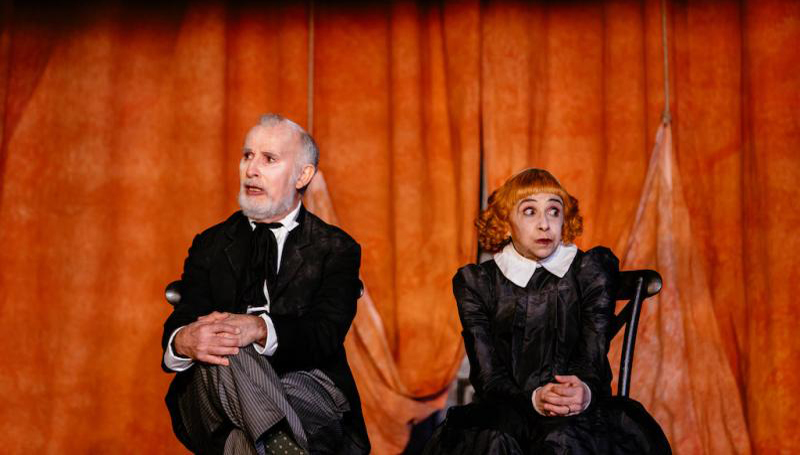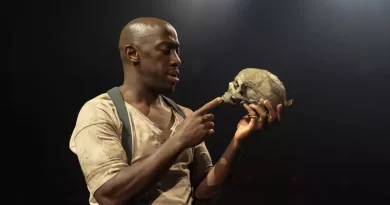“The Chairs”, Almeida Theatre
Neil Dowden in north London
17 February 2022
The slippery ambivalence of absurdist playwright Eugène Ionesco’s works makes them tricky to stage successfully. The Almeida’s production of his 1952 “tragic farce” The Chairs – a new adaptation by Omar Elerian featuring a stellar cast of Kathryn Hunter, Marcello Magni, and Toby Sedgwick – captures well the play’s surreal scenario with a mixture of touching pathos and physical comedy, but its metatheatrical framing doesn’t totally work.
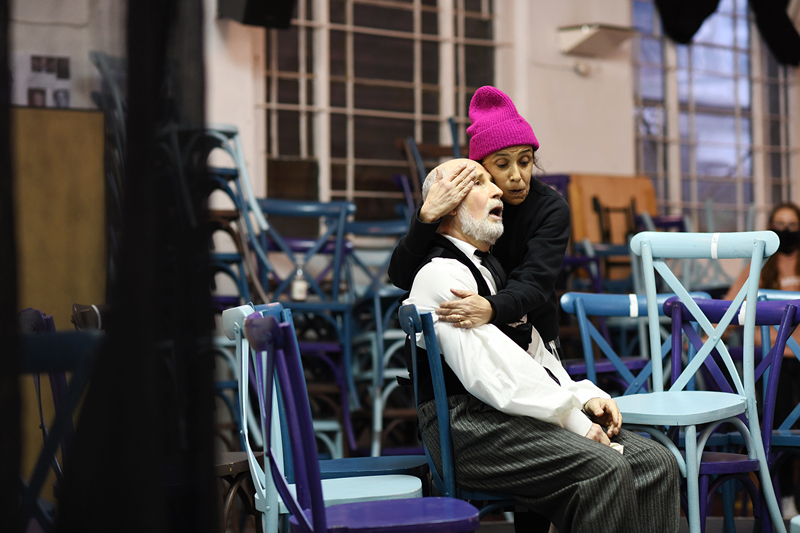
Marcello Magni and Kathryn Hunter. (Rehearsal picture).
Photo credit: Helen Murray.
The situation is one of existential crisis. On an island an Old Man and an Old Woman set up chairs for guests who are coming to hear an orator relay the Old Man’s message on the meaning of life. While they are waiting they reminisce sadly about their lives. But with the water levels rising, a blood-red sky, and London destroyed, this is a post-apocalyptic world. The fact that the guests turn out to be invisible suggests the old couple may be the only survivors, as if they have been rearranging the deckchairs on a sinking ship. Having apparently fulfilled their purpose, the old couple commit suicide by jumping out of a window. However, the message is never delivered.
In Ionesco’s original text, the audience’s assumptions are undercut by the arrival of an actor playing the orator, but in Elerian’s version the usually invisible emperor is embodied while the orator is not (there is just a microphone hanging down). The failure to deliver the message is originally because the orator is a deaf-mute, but here it is made to seem that the production itself has botched the climax.
Ionesco described the Old Man and Old Woman as “übermarionettes”, apparently trapped into performing repeated rituals while they are cut off from society. The play highlights the difficulty of communication especially in such an uncertain world where truth is so elusive. There is something peculiarly fitting about producing The Chairs now during a global pandemic when life has often seemed “unreal” and when many, especially elderly, people have spent a lot of time in self-isolation. The apocalyptic scenario is downplayed here, while the grotesque nature of the couple’s predicament is emphasized. The melancholic mood is countered by farcical moments, evoking music hall routines in a similar way to Ionesco’s fellow absurdist playwright Samuel Beckett.
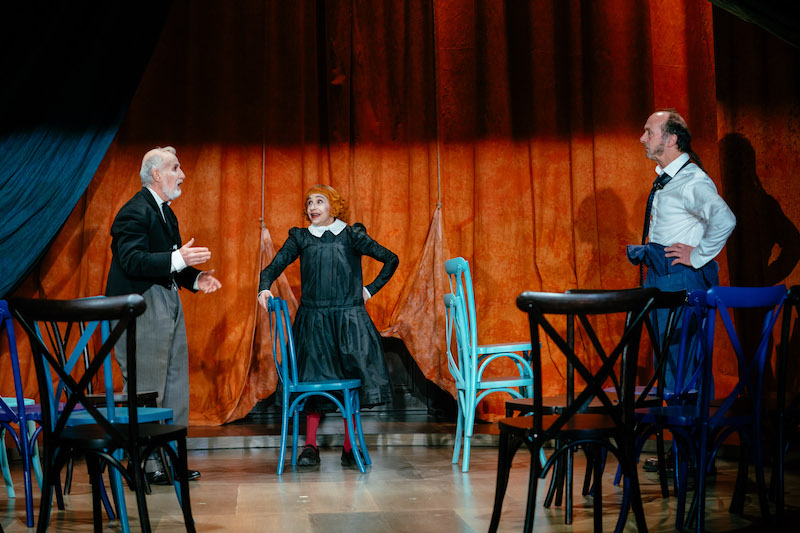
Marcello Magni, Kathryn Hunter and Toby Sedgwick.
Photo credit: Helen Murray.
Elerian’s version adds a Pirandellian dimension to the play which is in keeping with its non-naturalistic character but is slightly overdone. In a prologue we hear (via a Tannoy/transistor radio suspended above the stage) the actors talking as “themselves” backstage as Magni initially refuses to go on, which is quite an amusing spin on a piece that plays with theatrical conventions. But an epilogue in which Sedgwick directly addresses the audience to explain that the ending has been changed and to comment on the play itself is too long and feels forced. In between, though, there are some skilful touches when – as a stage manager – Sedgwick hands props to Hunter and Magni, or visibly creates sound effects, while they also occasionally acknowledge the audience in their game-playing.
At one hour and 45 minutes this production by Elerian (best known for his meta-show Misty which transferred from the Bush Theatre to the West End a few years ago) feels rather over-stretched for what is normally a short play. However, most of the performance is beguiling and it’s a brilliant idea to have the chairs spinning around on a revolve like a fantastical carousel. Co-designers Cécile Trémolières and Naomi Kuyck Cohen have swathes of lush theatrical curtains suggesting layers of artifice and reality.
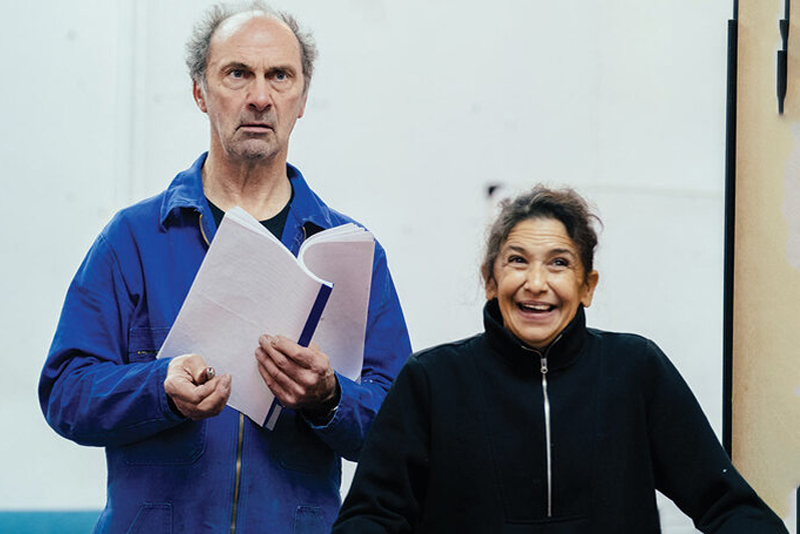
Toby Sedgwick and Kathryn Hunter. (Rehearsal picture).
Photo credit: Helen Murray.
The show is almost like an unofficial production by Complicité as all three actors have been closely associated with the company, with Magni a co-founder. (In fact, Théâtre de Complicté did actually stage The Chairs in the late nineties, with Simon McBurney directing Richard Briers and Geraldine McEwan.) Moreover, they and Elerian all studied at Ecole Jacques Lecoq in Paris, so the performances are very much in the physical theatre tradition.
Hunter and Magni (a real-life couple) portray a touching relationship as the long-married, mutually dependent Old Man and Old Woman, whose son has seemingly rejected them, with her comforting him when he is anxious and boosting his self-esteem in an almost maternal way. Hunter (recently seen in extraordinary form playing all three witches in Joel Coen’s film of The Tragedy of Macbeth) exudes a strong presence with her orange hair, doll-like frock, mechanical movements, and elfin expressions. The pale-faced Magni, wearing formal dress, conveys a childlike vulnerability, as a “master of the mop” who feels he has wasted his life. In an enlarged role, Sedgwick is seen and heard much more than usual (even at one point briefly coming on stage as Hunter’s “understudy”), giving rise to some droll humour – though the insertion of his closing monologue makes for an anti-climactic end to what has been an entertaining show.

